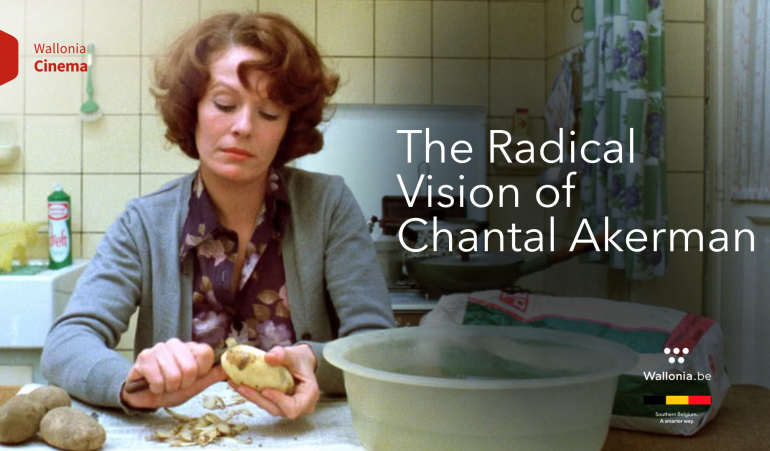
Throughout the history of cinema, some filmmakers have challenged ideologies, altered the medium and left an indelible mark on its narrative. Celebrated Belgian auteur, Chantal Akerman is easily one of the best examples of these visionaries.
Born in Brussels in 1950, Akerman crafted a repertoire of work which was not only experimental, but also deeply personal. Her films explored distinctive themes such as domesticity, displacement, feminism and identity, all the while remaining profoundly relevant, resonating with audiences, critics and contemporary filmmakers alike.
A Life Deep-Seated Within Creativity and Resilience
Akerman was the daughter of Jewish Holocaust survivors from Poland – an identity that infused her work with profound themes of exile, memory and trauma. She briefly attended the INSTITUT NATIONAL SUPERIEUR DES ARTS DU SPECTACLE ET TECHNIQUES DE DIFFUSION (INSAS) film school in Brussels before departing to build her own path.
At the age of eighteen, Akerman directed her first short film – Saute ma ville (1968), an obscure comic exploration of domesticity which heralded the innovative and boundary-pushing trajectory of her career.
Her stopover in New York during the early 1970s was a transformative one. Deeply immersed in the world of experimental and underground cinema, she experienced the works of artists like Michael Snow and Jonas Mekas, which bolstered her own minimalistic and observational approach. Akerman’s films from this period, such as – La Chambre 1 and La Chambre 2 (1972), alongside Hotel Monterey (1972), showcased her ability to bring profound meaning into mundane settings.
Reconceiving Feminist Cinema
In 1975, Akerman released her most renowned film – Jeanne Dielman, 23 quai du Commerce, 1080 Bruxelles. A film now regarded as the cornerstone of avant-garde and feminist cinema.
The nearly four-hour long study of a widow’s repetitive daily routine, culminating in an astonishing act, was a radical statement on the intersection of autonomy, domestic labour and gender.
© BFI
This trendsetting narrative and meticulous framing style reshaped how majestic cinema could be. In 2022 Jeanne Dielman, 23 quai du Commerce, 1080 Bruxelles, became the first female-directed film to champion the Sight and Sound poll of the greatest films of all-time.
Examining the Personal and Political
Akerman’s work navigated various genres, amalgamating documentary and fiction effortlessly. Many of her feature films, particularly that of – Les Rendez-vous d’Anna (1978), reflect her very own personal experiences of both alienation and connection as a filmmaker.
Her documentary-based films, including – D’Est (1993) and De I’autre côté (2002), explore significant themes of dislocation and migration, firmly positioning Akerman as a narrator of the marginalized.
She also briefly ventured into musical comedies – Golden Eighties (1986), romantic comedies – A Couch in New York (1996) and literary adaptations such as The Captive (2000), demonstrating an extremely high-level of versatility. Yet, Akerman’s works consistently retained her signature meditative style, signified by lengthy takes and an acute attention to space and time.
A Very Personal Affair
Her films often tended to look inwards, capturing her thoroughly intimate relationships and her deeply complex bond with her mother Natalia.
© filmin.es
This particular relationship with her mother was a recurring pattern, poignantly depicted in – News from Home (1976) and her concluding production No Home Movie (2015), an intensely gripping portrait of Natalia’s final months before her death.
Akerman’s confessional-based works, such as – Je Tu Il Elle (1974) and Chantal Akerman par Chantal Akerman (1997), further underscore her belief in cinema as an extension of the self and as a medium to confront and share personal truths.
An Everlasting Legacy
While Akerman passed away in 2015, her influence continues to reach all corners of global cinema. Filmmakers such as Céline Sciamma and Joanna Hogg cite her as a true source of inspiration.
The themes she explored, such as displacement, feminism and queerness, continue to resonate as new generations become increasingly focused on diverse and inclusive voices.
© Cinematek
Restorations and re-releases, such as the 2025 UK release of – Jeanne Dielman, 23 quai du Commerce, 1080 Bruxelles, ensure that Akerman’s films reach new generations, reaffirming her status as a legendary trailblazer who greatly redefined cinema’s boundaries.
The ongoing celebration of her work includes retrospectives like the BFI Southbank’s Adventures in Perception, which showcases the timeless relevance of her cinema across the months of February and March this year.
A Perpetual Idealist
Chantal Akerman’s productions are not only works of art, but also acts of introspection, profound empathy and rebellion. Her ability to challenge cinematic norms whilst remaining deeply personal makes her one of the most important filmmakers in history.
© theneweuropean.co.uk
As we revisit her oeuvre, we are constantly reminded of her powerful assertion: “I want people to experience film in their body”.
For anyone searching for a type of cinema that confronts, questions and ultimately serves to transform, Akerman’s repertoire remains an unparalleled treasure for all who may find it.
Linked articles
Related articles

The Semois Valley National Park: Adventure and Biodiversity in the Heart of Wallonia's Ardennes

Spa-Francorchamps & Escapade: Redefining Trackside Hospitality at the Legendary F1 Circuit

Google Doubles Down on Wallonia: €5 Billion Investment Puts the Region at the Heart of Data Infrastructure




